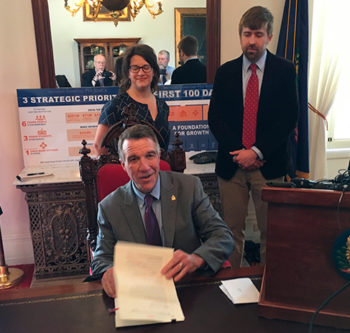
Vermont Gov. Phil Scott has signed legislation designed to protect journalists from having to give up their confidential sources and prevent government officials from conducting fishing expeditions on what reporters have been told.
“A free press is essential to our democracy and this legislation protects the role of journalists as neutral observers,” Scott said as he prepared to sign the legislation in his ceremonial office at the Statehouse May 17. The new statutory privilege provides additional protection to both journalists and sources, he said.
“This protection enables sources from whistleblowers to victims of a crime to feel confident in their ability to speak freely with the press,” said Scott, a Republican in his first term as governor.
Scott thanked lawmakers, including those with whom he doesn’t always see eye to eye on issues. There was overwhelming support in both chambers for the legislation. The Senate approved it unanimously and the House approved it 140-2.
The legislation was one of two priority issues in the legislature for the Vermont Press Association this year. A broad coalition of television, radio, freelance and online journalists joined the press association in advocating for the measure.
Scott presented his ceremonial pen from the signing to Paul Heintz, a member of the Vermont Press Association executive board, who was active in lobbying for the legislation. Heintz, an editor at the Burlington-based weekly Seven Days, said the new law provides extra protections that were not always acknowledged in the past by Vermont courts.
“I would like to implore Vermonters to reach out to us reporters with stories that need to be told. If you have faced injustice at the hand of a powerful person or institution, let us know. If you are a potential whistleblower, get in touch with us and blow that whistle. Thanks to (the new law), we can now more fully protect you,” he said after Scott asked him to say a few words.
He listed five Democratic legislators who helped get the legislation approved in both chambers. He also enumerated some key journalists who had provided strategy and testimony and spoke with legislators.
Vermont joins about 40 states that previously have enacted some kind of shield law for journalists, according to Adam Silverman, president of the Vermont Press Association and an editor and writer at The Burlington (Vt.) Free Press.
Scott’s ceremonial office was packed with journalists, legislators, lawyers and others interested in the issue.
“This was very important to the role the media plays, and delivers the message to the public,” House Minority Leader Rep. Don Turner, a Milton Republican, said after the ceremony. “It is critical that the message gets out to taxpayers.”
“We were fully on board,” said Turner, who took a red-eye flight from Arizona to be back for the signing and for one of the final days of the legislative session, which is in overtime.
Secretary of State Jim Condos, a Democrat and one of the first state officials to back the legislation, praised its passage.
“I have long maintained that the media is an important tool of transparency in government, acting as a watchdog for the public,” he said. “Not only that, it is important to realize that our media is the public, and deserves the same access to information, alongside appropriate protections for sources and process, that truly allows them to operate effectively as a free press.
“Without protections that prohibit the disclosure of news sources, whistleblowers will not feel comfortable bringing important information to journalists of media outlets. The signing of (the measure) into law ensures that our Vermont journalists and media sources can continue to serve the public as watchdogs, acting as a tool to help ensure transparency and accountability in government,” Condos said.
“Freedom of the press is crucial to our democracy, and the signing of (the measure) is another step forward in protecting this institution,” said Condos, who initially won state office in 2010 with campaign promises for transparency and improving open government laws, including public records and open meetings.
The Vermont Press Association said that, besides protecting reporters, the law provides protections to sources, including the accused, crime victims and whistleblowers, who can expose waste and wrongdoing. Some people have said that they have been reluctant to speak with reporters knowing there was little or no protection for journalists from a court order compelling disclosure of a source.
The legislation had widespread backing outside the Statehouse, including endorsements from Condos, Vermont Attorney General T.J. Donovan, the American Civil Liberties Union of Vermont, the Vermont Network against Domestic & Sexual Violence, and the Society for Professional Journalists.
The legislation also had backing within the Vermont judicial system. The few objections came from a couple of prosecutors, but they did not gain much traction.
